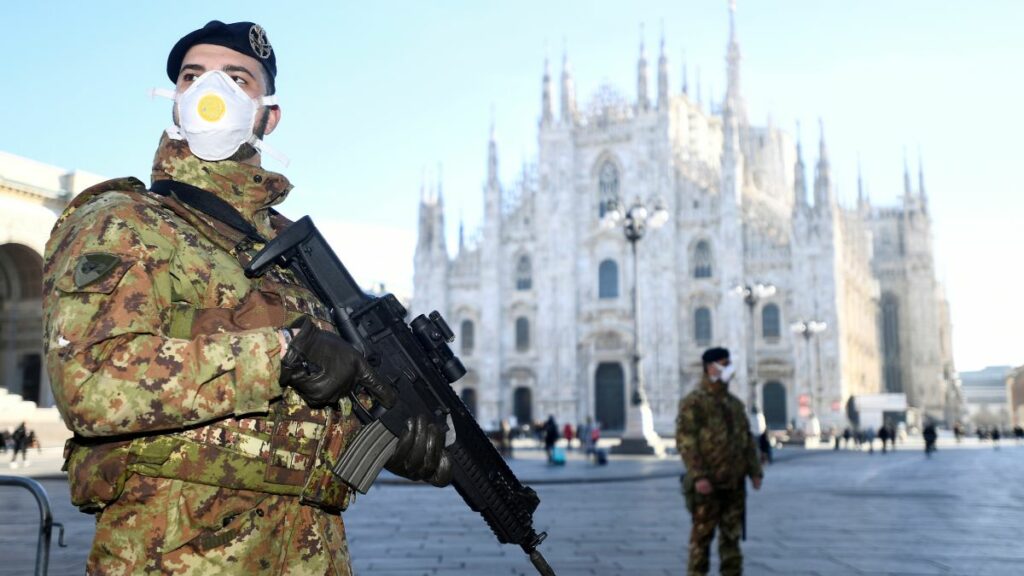Last updated on April 7th, 2020 at 09:11 am
Dear American friends,
I write from the trenches. Here in Lombardy, in Italy, we are on the front lines of a war. In these last couple of weeks, we have been alone. We have faced mockery in the international press: the New York Times, for example, released this article which openly and blatantly disrespects our country.
I can only say that I hope that no one in New York ever has to experience life the way we are experiencing it now in Italy.
The faith that remains deeply rooted in our towns, cities and provinces has been a source of consolation and help. Sadly, though, the solidarity and help we Italians hoped for from Europe and countries overseas has not materialized. Nonetheless, our friendships will not be weakened but strengthened by this crisis, this silent pestilence that threatens all of humanity and that has become a daily fight.
The precautionary measures enacted in Lombardy and all regions in northern Italy affect and limit every aspect of interpersonal life: we must maintain a one meter distance from friends and family members, which impacts one of the main dimensions of the human person, our natural desire for social interaction. As a Catholic, this has hit me in another way: In Italy, which has faced famine and plague more than once in Italy, all public masses have been suspended. This means a limitation on another kind of relationship, the most important for me: the connection I feel with Jesus Christ. But this compulsory “fast” has not just caused melancholy, it has also spurred a surge in devotion of people going and praying before the tabernacle in open churches. In Lombardy, where there is a special devotion to the Virgin Mary and many Marian shrines, we have seen this crisis as a call to pray the rosary, asking for an end of the Coronavirus outbreak. These are some of the signs of hope.
It isn’t easy to live locked in our homes with the government restrictions on our freedom and movement. It is a situation rife with difficulties and anxieties, truly life in the trenches: life in a war against a viral outbreak that is unconventional and truly novel. For weeks, every day at sunset, we’ve waited for the official updates. And every day, the number of deaths increases, especially in Lombardy and other northern regions. While we are constantly concerned about the numbers showing an increase in infections, we find hope in the numbers of recovery. As of this writing, there are over 24,700 infected in Italy, with nearly 1,900 deaths, and about 2,400 people who have recovered. In Lombardy, the numbers are 10,100 infected and 1,300 dead.
Where I am writing — Saronno, a province of Varese — is a place of industrious people, “self-made” individuals, craftsmen, small business owners, and co-ops. In the past, all of these things helped create a network of solidarity that supported economic strength and recovery. But now, streets are empty. It seems like the month of August, when the region empties as people go on holiday. But if people are less devoted to consumerism and the market, they are no less devoted to God, and ultimately the salvation of people, the welfare of souls, will not depend on food stocks and the market but on hearts and minds.
One of our best Lombard writers, Alessandro Manzoni, wrote The Betrothed in 1827. He talked about the love between Renzo and Lucia, their complicated engagement and marriage in the early 17th century. The story provides a real view of the brilliance, faithfulness, and self-sacrificial love characteristic of our region. In chapters 31-33, Manzoni writes about a plague that struck during the protagonist’s lifetimes, and it bears similarity to what is happening now. Doctors face death in order to save lives and take care of infected people. This is how doctors are behaving now, courageously—in contrast to the lying and insulting reports by international mainstream media about doctors choosing whom to treat while letting others die.
The sparse streets, friends keeping their distance and only waving at one another if they should meet, the stockpiling of food: all of these are troubling. But we also find ourselves spending more time at home with our families. In this way, in fighting the coronavirus we are also fighting another scourge, that of consumerism and globalism. Italians are singing the national anthem from their windows, lighting candles to encourage one another; or else singing hymns to the Lord and lighting a candle as a sign of hope in God. If you have friends or family in Italy, especially in the north, please reach out to them: show them your closeness, your compassion. If you are able, send donations or care packages, which can be used to help the lonely and the poor. Whatever you do, do not forget us: we need your support, because we are determined to keep fighting, with straight backs, getting our hands dirty, and our heads held high.
Dear friends, in every difficulty in life, even serious ones such as this, we know there is always hope: that Divine Providence will provide us help.
This letter is an opportunity for me—and I hope it will be for all of you too—to express that confident assurance. God bless the USA, and may He help Italy at this critical time.
